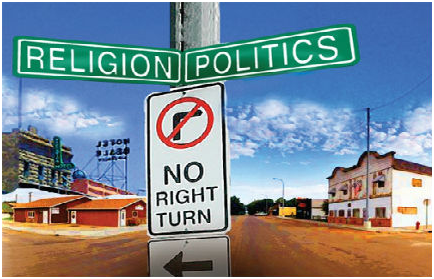
Historically speaking, religious identities have always worked to demean and even subdue each other. Indeed, the politically weaker ones are often forced to subsume their identities and convert to the beliefs and practices of the politically dominant. This process involves a lot of violence – direct or subtle. Sometimes they can also be purchased for whatever their worth.
In the emerging new politics, secularism has become a dirty word, but Akeel Bilgrami, a leading analytical philosopher, has recently come up with a new characterization and justification. Bilgrami has offered a fine proposition on the question of religious struggles and responsibilities of a modern state. The usual secular position is of separation of church and state and state maintaining a neutral equidistance from different religions within a plural society. Bilgrami has however suggested that even as all religions should have the privilege of free exercise and be evenhandedly treated, but when religious practices and aspirations are against the virtues of a modern polity such as fundamental rights and other constitutional commitments, the political ideals of a modern state must be placed first and privileged over everything else.
While speaking about these issues in the context of medieval India, one is either accused of projecting modern problems back in time when they did not exist or charged with merely criticizing existing scholarship than presenting a new theoretical framework. In these times of intolerance in academia as in religion and politics, a new theoretical framework is not easily allowed to be developed through which one may have a fresh look at the past without sounding like merely criticizing what was said earlier and at most offering just a ‘revisionist’ interpretation. Much glorified patriarchal old men, might pretend as be-all liberals and torchbearers of secularism, etc., but on closer look, ideologically and historiographically, one may find them as extremely dogmatic in their approach, though they might still appear more reasonable than the aggressive right-wing ideologues, goons, and terrorists.
Perhaps, a left of the centre liberal position could still show the way, despite the failure of Marxism and secularism in India, but will a liberal framework be acceptable to the historians of medieval India, both leftists and rightists? Or, will the proponents of various modern ideologies continue to abuse history, even as those who have infiltrated into the academia claim to be committed to history as a professional discipline, a Science? On closer scrutiny, it might appear that we are basically struggling against various kinds of crude political propaganda and political action and not so much any refined and coherent political ideology, and certainly not any complex political theory or framework.
How does one deal with such a situation? Tolerance and space for difference can be one simple answer. This can help form a broad and inclusive perspective, which in the case of medieval India the Mughal emperor Akbar was certainly able to develop by listening to all and which his great grandson Aurangzeb could not because, in certain moments, he invoked and pandered to Islamic orthodoxy. Akbar was able to develop an inclusive approach to politics and legitimately earned the reputation for doing something great; Aurangzeb’s partisan approach could have only been appreciated by a section of the interested parties and hence he is a hero for some and villain for others.
Similarly, Sufis could evolve an acceptable language and common grounds, which the self-styled guardians of Islam, ulama, could not. Low-caste bhakti saints could speak against social inequities, the pundits could not. Some of the exalted Gurus did speak of social harmony, but their ill-trained chelas not. For some bigotry was the guiding principle of life, for others justice and humanity. More disturbing, then as now, is the use of religion by the state and extra-state actors for justification of political violence, whereas the state is expected to be able to break free from the clutches of religion to uphold such ideals as free speech, liberty, equality, gender-justice, etc., if not kissing and pissing in public.
Will the Gandhian framework of understanding and tolerating India’s religious culture – shared or disparate – be more appropriate for a religiously plural context of India with the ‘neutral state’ committed to justice for all? The lesson from the past is that this framework will not work in a context of religious majoritarianism built around notions of minority appeasement and backlashes; Gandhi paid with his life as we all know.
Are there any takers for such a proposition, that is, the state privileging free speech, gender-justice, etc., over political pressure from assertive religious groups? This is important as we historically know, extreme ideology of any kind – political, economic, or religious – cannot be sustained beyond a point and, therefore, it is in the interest of those in authority to ensure that reason and sanity must prevail. Inclusion, and not exclusion, should be the cardinal principle of a civilized and modern society, and this is true for all stakeholders – left, right or centre.

